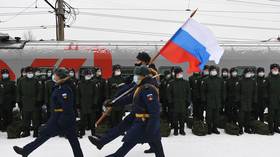Are you ready for nuclear war?
While the ongoing Ukraine war scare has brought Europe to the brink of crisis, at the same time, it has given rise to modest, but promising, hope that there could be a revival in diplomacy and negotiations between great powers.
For one, the presidents of both Russia and the US have held direct talks – a far too rare occurrence. Even if the progress has been less than spectacular, there is a renewed sense that saber-rattling has given way to actual high-level diplomacy.
Against this backdrop, however, an influential American senator has made himself stick out like a sore thumb. Sen. Roger Wicker (Republican-Mississippi) went public just days ago to advise President Joe Biden to keep his options open when it comes to Ukraine. He suggested not just considering using conventional military force but potentially deploying the country’s arsenal of nuclear weapons.
His intervention has provoked objections, including from the Russian Embassy in Washington, DC. Wicker, however, has not withdrawn his words. He merely backpedaled a little, clearly trying to soften the impact of his statements while sticking to their meaning. We could dismiss his bizarre sally as just one more attempt by American liberals and conservatives to appeal to a domestic audience with a seemingly insatiable appetite for aggressive rhetoric toward Russia.
Yet, there are two reasons why this case should not be taken so lightly. For one thing, Wicker is not a minor player or outsider. He is the senior senator from Mississippi and serves as the second-most important member of the Senate’s Armed Services Committee. Second, he has not confined himself to generalities but has been specific about two extremely disturbing suggestions. One is that the US should be ready to launch nuclear weapons against Russia, and the second is that it should be prepared to use them first.
However, to be ready for a first strike against Russia has clear implications. It’s possible Wicker does not care about what his words mean beyond their desired impact on certain voter demographics. But let’s give the senator the benefit of the doubt and assume he has some kind of idea beyond pure demagoguery when talking about nuclear war.
In that case, there are only two possibilities. Either Wicker believes that a full-scale, global nuclear war over eastern Ukraine should not be ruled out. Because that could easily follow from such an American assault. Or, if we give Wicker the benefit of the doubt again and assume that he is not ready to risk the whole planet, including the US, over what is – with all due respect to Ukraine – a comparatively limited conflict, there is only one possibility left. He must believe that Washington could start and wage and, presumably, win a limited nuclear war.
And that is, actually, the most frightening thing about the senator’s bluster. Because, unfortunately, this insanely dangerous idea has become popular among American politicians.
In early 2020, Washington not only conducted an exercise to simulate such a limited nuclear war with Russia but made a point of informing the global public in unusual detail. Following on the deployment of new nuclear weapons of a comparatively low yield, the message was clear: the Pentagon believes it is possible to wage (and, of course, win) a nuclear war that would stay small enough to make it an extreme but realistic option of policy.
While this was a recent and especially overt reminder that the notion of a limited nuclear war exerts disturbing attraction, its roots reach deep into the Cold War. It was in the 1970s that American leaders began to systematically consider whether there was a way of fighting the Soviet Union with nukes but without suicidal escalation.
There is no reason to assume that similar ideas were not circulating in the Cold War East. Just as today it would be naive to think that only Washington is pursuing the concept. In fact, the US is of course claiming it does so only in response to Russian moves. As so often, it is futile to try to figure out who started things. The point that matters is that there is an international dynamic driving nuclear powers – large and small – to explore the option of a limited use of their most horrifying weapons.
There are two obvious dangers in this trend. First, it can mislead political and military leaders into downplaying and underestimating what any, even a less than fully apocalyptic, use of nuclear weapons would mean, namely mass casualties and great, lasting damage to a biosphere that is already in a deteriorating state in peace time. Modeling shows that even a comparatively “small” nuclear war, for instance between India and Pakistan, would have global climate effects. Experts disagree whether they would be powerful enough to cause a full nuclear winter. But there is no doubt that they would be severe.
The second reason the idea of limited nuclear war is so specious is that keeping things limited once nukes destroy major installations and weapons systems, whole armies, and cities, will probably be impossible. Planners may be arrogant enough to believe they can conduct a controlled and restricted armageddon. In reality, it makes more sense to assume that the chaos, disorientation, and sheer fury caused by any nuclear attack will escalate into a full-scale and all-consuming nuclear war.
The idea of limited nuclear war is a horrible temptation for hubristic policymakers: It is based on accepting a “lesser evil” that, in reality, would already be enormous and it promotes a fatal illusion of control that undermines the deep, healthy fear everyone should feel of any use of nukes. Senator Wicker’s folly is merely one example of how this moral and intellectual fallacy is spreading. It should be seen as a warning.
The statements, views and opinions expressed in this column are solely those of the author and do not necessarily represent those of RT.
The statements, views and opinions expressed in this column are solely those of the author and do not necessarily represent those of RT.














